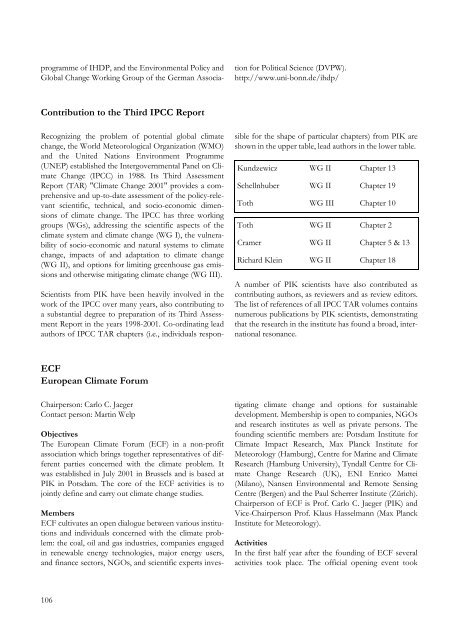PIK Biennial Report 2000-2001 - Potsdam Institute for Climate ...
PIK Biennial Report 2000-2001 - Potsdam Institute for Climate ...
PIK Biennial Report 2000-2001 - Potsdam Institute for Climate ...
You also want an ePaper? Increase the reach of your titles
YUMPU automatically turns print PDFs into web optimized ePapers that Google loves.
programme of IHDP, and the Environmental Policy and<br />
Global Change Working Group of the German Associa-<br />
Contribution to the Third IPCC <strong>Report</strong><br />
Recognizing the problem of potential global climate<br />
change, the World Meteorological Organization (WMO)<br />
and the United Nations Environment Programme<br />
(UNEP) established the Intergovernmental Panel on <strong>Climate</strong><br />
Change (IPCC) in 1988. Its Third Assessment<br />
<strong>Report</strong> (TAR) "<strong>Climate</strong> Change <strong>2001</strong>" provides a comprehensive<br />
and up-to-date assessment of the policy-relevant<br />
scientific, technical, and socio-economic dimensions<br />
of climate change. The IPCC has three working<br />
groups (WGs), addressing the scientific aspects of the<br />
climate system and climate change (WG I), the vulnerability<br />
of socio-economic and natural systems to climate<br />
change, impacts of and adaptation to climate change<br />
(WG II), and options <strong>for</strong> limiting greenhouse gas emissions<br />
and otherwise mitigating climate change (WG III).<br />
Scientists from <strong>PIK</strong> have been heavily involved in the<br />
work of the IPCC over many years, also contributing to<br />
a substantial degree to preparation of its Third Assessment<br />
<strong>Report</strong> in the years 1998-<strong>2001</strong>. Co-ordinating lead<br />
authors of IPCC TAR chapters (i.e., individuals respon-<br />
ECF<br />
European <strong>Climate</strong> Forum<br />
Chairperson: Carlo C. Jaeger<br />
Contact person: Martin Welp<br />
Objectives<br />
The European <strong>Climate</strong> Forum (ECF) in a non-profit<br />
association which brings together representatives of different<br />
parties concerned with the climate problem. It<br />
was established in July <strong>2001</strong> in Brussels and is based at<br />
<strong>PIK</strong> in <strong>Potsdam</strong>. The core of the ECF activities is to<br />
jointly define and carry out climate change studies.<br />
Members<br />
ECF cultivates an open dialogue between various institutions<br />
and individuals concerned with the climate problem:<br />
the coal, oil and gas industries, companies engaged<br />
in renewable energy technologies, major energy users,<br />
and finance sectors, NGOs, and scientific experts inves-<br />
106<br />
tion <strong>for</strong> Political Science (DVPW).<br />
http://www.uni-bonn.de/ihdp/<br />
sible <strong>for</strong> the shape of particular chapters) from <strong>PIK</strong> are<br />
shown in the upper table, lead authors in the lower table.<br />
Kundzewicz WG II Chapter 13<br />
Schellnhuber WG II Chapter 19<br />
Toth WG III Chapter 10<br />
Toth WG II Chapter 2<br />
Cramer WG II Chapter 5 & 13<br />
Richard Klein WG II Chapter 18<br />
A number of <strong>PIK</strong> scientists have also contributed as<br />
contributing authors, as reviewers and as review editors.<br />
The list of references of all IPCC TAR volumes contains<br />
numerous publications by <strong>PIK</strong> scientists, demonstrating<br />
that the research in the institute has found a broad, international<br />
resonance.<br />
tigating climate change and options <strong>for</strong> sustainable<br />
development. Membership is open to companies, NGOs<br />
and research institutes as well as private persons. The<br />
founding scientific members are: <strong>Potsdam</strong> <strong>Institute</strong> <strong>for</strong><br />
<strong>Climate</strong> Impact Research, Max Planck <strong>Institute</strong> <strong>for</strong><br />
Meteorology (Hamburg), Centre <strong>for</strong> Marine and <strong>Climate</strong><br />
Research (Hamburg University), Tyndall Centre <strong>for</strong> <strong>Climate</strong><br />
Change Research (UK), ENI Enrico Mattei<br />
(Milano), Nansen Environmental and Remote Sensing<br />
Centre (Bergen) and the Paul Scherrer <strong>Institute</strong> (Zürich).<br />
Chairperson of ECF is Prof. Carlo C. Jaeger (<strong>PIK</strong>) and<br />
Vice-Chairperson Prof. Klaus Hasselmann (Max Planck<br />
<strong>Institute</strong> <strong>for</strong> Meteorology).<br />
Activities<br />
In the first half year after the founding of ECF several<br />
activities took place. The official opening event took

















